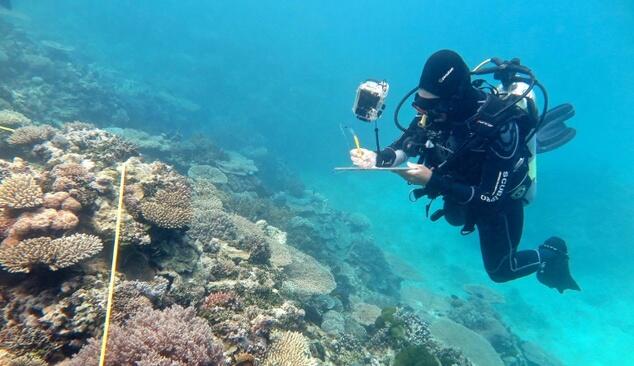The Great Barrier Reef is “not dying”, Australia insisted today as it updated UNESCO on efforts to protect the natural wonder while scientists blasted a lack of urgency in dealing with climate change.
Canberra last year narrowly avoided the UN body putting the site on its endangered list and was ordered to report to the World Heritage committee by December 1 on its “Reef 2050” rescue plan.
The giant ecosystem — a major tourist attraction — is under pressure from farming run-off, development, the crown-of-thorns starfish and climate change, which led to its worst-ever bleaching event this year that devastated swathes of coral.
In the report, the government said 32 of the plan’s 151 actions to improve the reef had been achieved. Another 103 were under way, four were delayed, and 12 were not yet due.
“When we came to government we inherited a reef on UNESCO’s endangered watch list,” Environment Minister Josh Frydenberg told Sky News.
“We’ve done everything possible since that time to put in place a plan, to invest huge amounts of resources to improve water quality, to work with the farming community to tackle the crown-of-thorns starfish and to preserve this natural wonder of the world.
“We have to put the facts on the table,” he added. “The reef is not dead, it’s not dying, it’s resilient, it’s healthy and we’ve made great strides forward in the last few years.”
The government has committed more than Aus$2.0 billion (US$1.5 billion) to protect the reef over the next decade with the update highlighting progress on land management practices to prevent sediment run off, which helps spawn the coral-eating starfish.
It also pointed to a ban on sea-based disposal of dredge material in the area and restrictions on new port developments.
But the rescue plan included no new funding or commitments to tackle climate change despite acknowledging this was the reef’s biggest threat.
This year’s bleaching, due to warming sea temperatures, killed two-thirds of shallow-water corals in the north of the 2,300-kilometre (1,400-mile) long reef, although central and southern areas escaped with less damage.
‘Not credible’
The update said Canberra was acting on global warming through the United Nations talks that led to the recent Paris climate deal, but scientists said it was not enough to rein in Australia’s carbon pollution.
“Funding water quality efforts on the reef while failing to do anything about climate change is a bit like fixing a window while the house is on fire,” said Tim Flannery from the independent Climate Council.
“I’m not even sure you can call a plan that includes no new funding and no new actions on climate change a plan — it’s simply a re-announcement of old commitments.”
Greenpeace Australia was equally scathing, saying it was unacceptable that while recognising the impact of global warming on the reef the government “then completely fails to do anything about it”.
“This plan does not even consider a significant reduction in carbon emissions so is simply not credible,” said reef campaigner Shani Tager.
“If the government was serious about protecting the Great Barrier Reef, a ban on new coal mines would have been the first point in its report to UNESCO.”
Frydenberg said the government was committed to tackling global warming and recently ratified the Paris agreement, the world’s first universal climate pact, which came into force in early November.
“We’ve adopted targets that are 26 to 28 percent reduction of our emissions by 2030 on our 2005 levels. On a per capita basis, that’s more than 50 percent,” he said.
“We are doing a lot of things in a lot of areas and the reef is strong.”
With heavy use of coal-fired power and a relatively small population of 24 million, Australia is considered one of the world’s worst per capita greenhouse gas polluters.
Source: AFP











